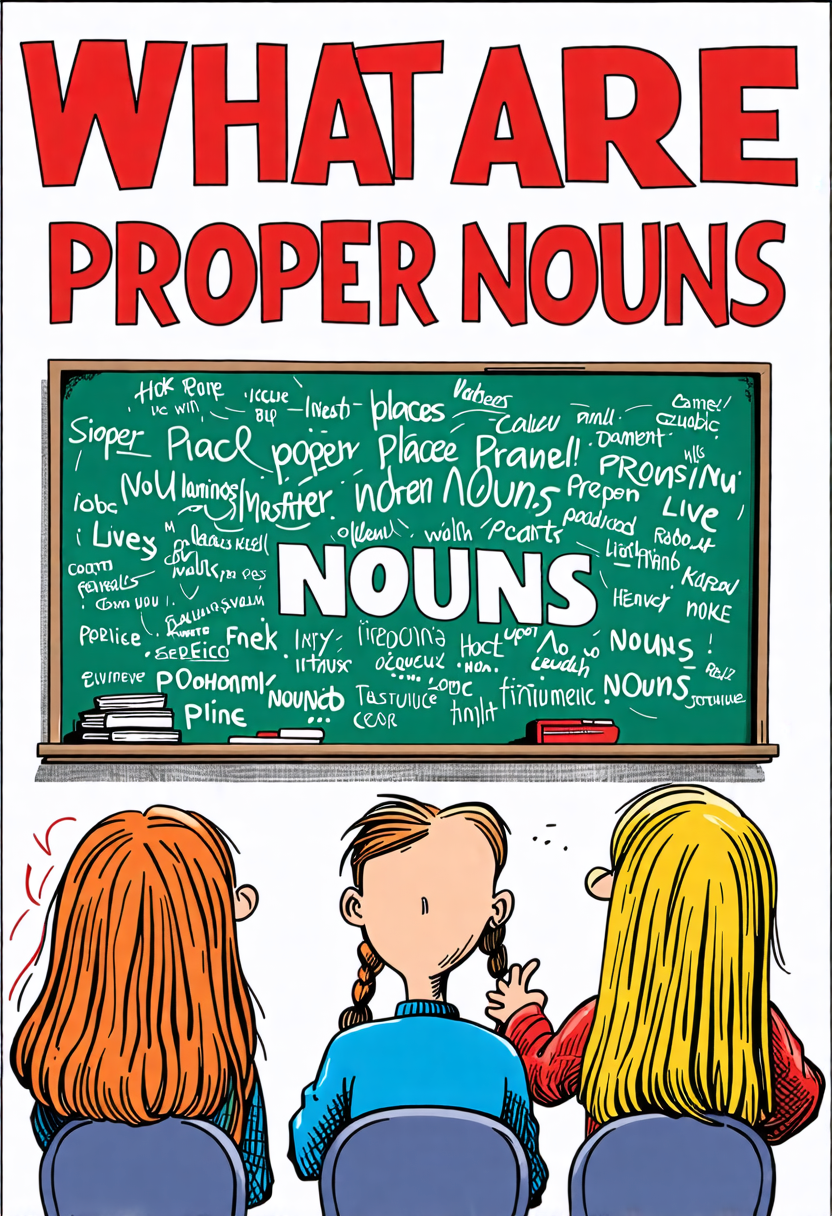What Are Proper Nouns?
Proper nouns are specific names for individual people, places, or entities and are always capitalized. These include names like ‘Serena Williams’, places like ‘São Paulo’, and titles like ‘Mount Everest’. Proper nouns differ from common nouns, which refer to general categories.
They play a vital role in clarity and precision in writing. Proper capitalization of these nouns is essential as it helps in distinguishing specific subjects and enhances readability. Family relationship titles and geographical directions follow specific rules for capitalization as well.
Definition of Proper Nouns
A proper noun is a specific name given to an individual person, place, or thing. These nouns are distinct from common nouns, which refer to general categories or types of entities.
For example, while ‘city’ is a common noun, ‘New York’ is a proper noun. Proper nouns uniquely identify specific names and are always capitalized. This distinction helps in providing clear and precise information in writing.
Understanding the difference between proper and common nouns is important for accurate capitalization. Proper nouns enhance readability by clearly indicating specific entities.
Every noun can be classified as either common or proper, and mastering this classification is important for effective communication.
Examples of Proper Nouns
To better understand proper nouns, let’s look at some specific examples. A proper noun refers to a specific person, place, or thing. For instance, ‘Serena Williams’ names a particular athlete, and ‘São Paulo’ identifies a specific city in Brazil.
Another example is ‘Lord of the Rings,’ which is the title of a well-known book series. Each of these names is distinct and unique.

Other examples include ‘Mount Everest,’ the tallest mountain in the world, and ‘The White House,’ the official residence of the President of the United States. Companies like ‘Apple’ and ‘Google’ are also proper nouns.
Proper Vs. Common Nouns
Understanding the distinction between proper nouns and common nouns is essential for clear and accurate writing. Proper nouns refer to specific names of people, places, or things, such as ‘Serena Williams,’ ‘São Paulo,’ and ‘Lord of the Rings.’ In contrast, common nouns are generic terms for items within a class, like ‘athlete,’ ‘city,’ and ‘book.
Here are three key differences:
- Specificity: Proper nouns specify individual entities, whereas common nouns describe general categories.
- Capitalization: Proper nouns are always capitalized, while common nouns are not, ensuring clarity.
- Usage: Proper nouns provide precise identification, enhancing specificity in writing.
Importance of Capitalization
Capitalization plays an essential role in enhancing the readability and clarity of your writing. Proper nouns, such as names of people, places, and specific things, must be capitalized to distinguish them from common nouns. This distinction helps readers easily identify and understand the specific subjects being referred to.
For instance, ‘amazon’ could imply a river, a mythical warrior, or a global company, but ‘Amazon’ clearly identifies the company. Misuse of capitalization can lead to confusion and misinterpretation. Hence, knowing which words to capitalize improves both the professionalism and readability of your text.
Family Relationship Nouns
Proper capitalization also applies to family relationship nouns when used as names. This means that titles like ‘Mom,’ ‘Dad,’ ‘Grandma,’ or ‘Uncle’ should be capitalized when they replace or are used as proper names. However, when these nouns are used generically, they should remain lowercase.
For example, consider the following:
- ‘Please ask Mom if she’s coming’ (name replacement).
- ‘My Mom is a great cook’ (generic use).
- ‘Uncle Joe is visiting us’ (name replacement).
Capitalizing Directions
When it comes to directions, capitalization rules can be tricky. Compass directions like north, south, east, and west are not capitalized when they refer to general directions. For example, ‘The trail continued west.’
However, when these directions are part of a proper name or a recognized region, they should be capitalized. For instance, ‘She lives on the West Coast’ or ‘They traveled to the South of France.’
Understanding when to capitalize directions helps maintain clear and professional writing. It’s important to recognize whether the term is being used generically or as a specific place name. This distinction ensures that your writing is both accurate and easy to read.
Capitalizing Seasons
After understanding the nuances of capitalizing directions, it’s important to address the rules for capitalizing seasons.
In general, the names of seasons—spring, summer, fall, and winter—are not capitalized. However, there are exceptions when seasons are part of a proper noun or title. For instance:
- Proper Names: ‘Spring Festival’ or ‘Winter Olympics’
- Titles: ‘The Summer 2023 Issue of the Magazine’
- Personification: If a season is personified in literature, it may be capitalized, e.g., ‘Winter’s icy grip.’
Job Titles Capitalization
In professional writing, job titles are capitalized only when they directly precede a person’s name or are used in a formal context. For example, ‘President John Doe’ or ‘Manager Jane Smith’ requires capitalization. However, when referring to a job title in a general sense, such as ‘the president’ or ‘the manager,’ it should remain lowercase. This rule helps maintain clarity and professionalism in your text.
Additionally, job titles in headings, signatures, or when addressing a person formally should also be capitalized. For instance, ‘Dear Chief Executive Officer,’ or ‘Sincerely, Project Manager.’ Consistent application of these rules ensures your writing adheres to standard conventions, improving readability and professionalism.
Brand Names Capitalization
Brand names, as proper nouns, should always be capitalized to guarantee correct usage and readability. This assures that the brand stands out and is easily recognizable. Here are three reasons why capitalization of brand names is essential:
- Brand Identity: Capitalization helps maintain the brand’s identity, making it distinct and memorable.
- Professionalism: Correct capitalization reflects professionalism and attention to detail in your writing.
- Clarity: Proper capitalization avoids confusion between brand names and common nouns, ensuring clear communication.
For example, writing ‘Nike’ instead of ‘nike’ immediately signals the brand rather than a generic item. Similarly, ‘Google’ specifies the company, not a general search term. Always capitalize brand names to uphold their identity and enhance readability.
Eponyms and Capitalization
Eponyms, derived from the names of people, may or may not require capitalization depending on their usage. When an eponym directly refers to a specific person, it is usually capitalized. For instance, ‘Parkinson’s disease’ is named after Dr. James Parkinson.
However, when an eponym becomes a common term, capitalization might not be needed. An example is ‘sandwich,’ named after the Earl of Sandwich, but now used as a common noun.
Consistency in capitalization is vital for clarity and readability. It’s important to recognize the context in which eponyms are used to determine if they should be capitalized, ensuring precise and professional writing.







